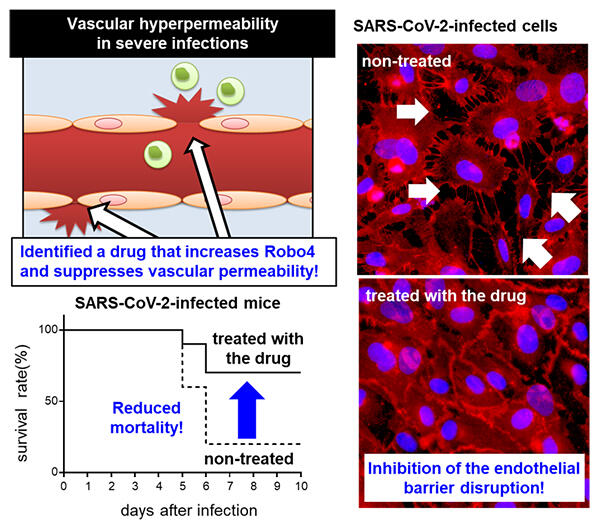A research group led by PhD student Maaya Morita and Associate Professor Yoshiaki Okada of the Graduate School of Pharmaceutical Sciences, Osaka University, found that increasing the expression level of the Robo4 gene, which functions to inhibit vascular permeability, can increase permeability, and reduce mortality in mice with severe infection (septicemia). They also identified a drug (ALK1 inhibitor) that increases Robo4 levels based on the mechanisms regulating its gene expression and demonstrated that this drug can reduce vascular permeability in the lungs and reduce mortality in mice infected with septicemia and COVID-19. "The therapeutic strategy of targeting blood permeability is theoretically independent of the type of pathogen and could therefore contribute to the development of drugs for new and unknown infectious diseases," said Okada. "Moving forward, we would like to work on an optimal molecular design, as well as joint research with companies." The research group's findings were published in Proceedings of the National Academy of Sciences.

Provided by Osaka University
When pathogens invade the body, immune cells are activated, and inflammatory cytokines are produced. Vascular endothelial cells are bound by VE-cadherins, but inflammatory cytokine stimulation in the blood causes the VE-cadherins to diverge from each other, increasing vascular permeability. This function allows more immune cells to circulate in the body, but if this vascular permeability progresses too far, it can lead to issues such as pneumonia or pulmonary oedema, septicemia, and multi-organ failure.
Robo4 is a protein specifically expressed on blood endothelial cells and is known to stabilize vascular endothelial cells and reduce their permeability during inflammation. The research group has previously shown that vascular permeability can be manipulated by the amount of expressed Robo4 and that mice without the Robo4 gene have increased vascular permeability and mortality from sepsis.
The research group conducted a study to see if increasing the amount of Robo4 could inhibit vascular permeability and treat severe infections.
First, they generated overexpressing mice in which the amount of Robo4 was two to three times higher and vascular permeability in the lungs was suppressed, compared to wildtype mice. Furthermore, when they induced sepsis by administering lipopolysaccharide, a bacterial membrane component, the mortality rate fell from over 90% in wildtype mice to around 45% in overexpressing mice.
To identify the mechanisms that regulate the amount of Robo4, the researchers generated cells that glow when they express Robo4, searched for drugs that alter Robo4 from more than 2000 compounds in the compound library and analyzed the results, which revealed that ALK1 reduces Robo4 via SMAD1/5. They also found that compound K02288 inhibits ALK1.
Next, they analyzed whether ALK1 inhibitors could suppress the pathogenesis of murine sepsis and found that ALK1 inhibitors increased the amount of Robo4 in the lungs of mice and suppressed the permeability of pulmonary vessels in septic individuals. Treatment with ALK1 inhibitors also improved the mortality rate of septic mice from over 80% to around 45%.
Analysis of the vascular permeability of COVID-19 using an airway chip developed by CiRA showed that ALK1 inhibitors reduce virus passage from the airway channel to the blood channel by up to a third. Vascular channels treated with ALK1 inhibitors prevented the disruption of cell adhesion by the virus. Furthermore, treatment of mice infected with COVID-19 with an ALK1 inhibitor reduced lung damage caused by the virus and improved mortality from 90% to 30%.
"We have seen a preventative effect on the condition in our research, but we would like to confirm whether it can be used in combination with other drugs to further reduce mortality, and whether it can be widely applied to infections other than sepsis and COVID-19," said Okada. "We also want to develop drugs that, once a patient is infected, can be taken as a preventive measure to strengthen blood vessels and prevent serious illnesses."
Journal Information
Publication: Proceedings of the National Academy of Sciences
Title: Upregulation of Robo4 expression by SMAD signaling suppresses vascular permeability and mortality in endotoxemia and COVID-19 models
DOI: 10.1073/pnas.2213317120
This article has been translated by JST with permission from The Science News Ltd. (https://sci-news.co.jp/). Unauthorized reproduction of the article and photographs is prohibited.




